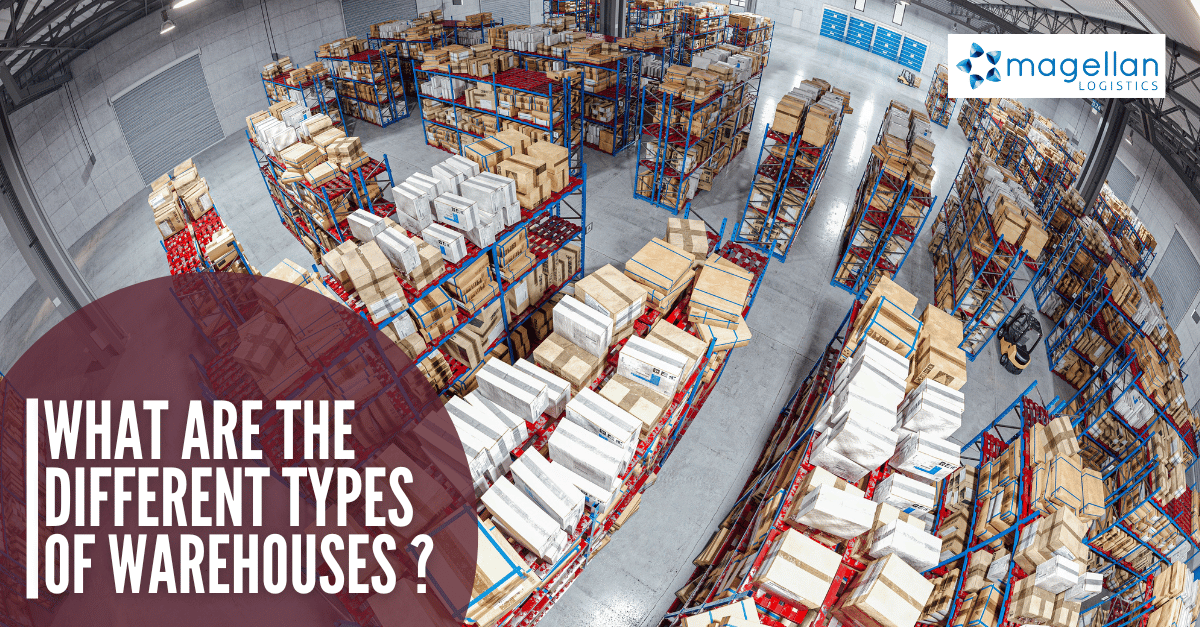What are the types of warehousing?
Warehouses are specialised facilities designed to store and manage goods, serving various purposes. As businesses grow, their need for secure and organised storage also increases, which is where warehouses come into play. This article explores the benefits of different types of warehouses and how they can optimise storage and logistics operations for businesses.
With the booming warehousing industry, there has been a diversification of warehouse types and services offered by providers. Understanding the benefits of these different warehouse types and determining which products are best suited for each is crucial.
Distribution centres
Distribution centres are specialised facilities that receive, process, and ship large volumes of products to customers. They are crucial in the supply chain, ensuring quick and efficient product delivery. Distribution centres located near major transportation routes, such as highways, railways, and ports, facilitate easy transportation of goods.
One of the main advantages of distribution centres is their speed. These facilities employ advanced technologies like automated storage and retrieval systems (AS/RS), robotics, and sensors, enabling real-time inventory tracking and management. Consequently, products can be processed and shipped quickly, reducing delivery times and enhancing customer satisfaction.
Distribution centres also offer flexibility, handling a wide range of products in terms of size and packaging. Whether small or large items, or different types of packaging such as pallets, boxes, or cartons, businesses can efficiently store and distribute their products, regardless of size or shape.
Furthermore, distribution centres provide cost savings. By consolidating products and shipments, businesses can reduce transportation costs and enhance efficiency. Additionally, distribution centres offer value-added services such as packaging and order processing, further streamlining operations.
Public warehouses
Public warehouses, operated by third-party logistics providers, offer storage space to businesses on a short-term or long-term basis. These warehouses are ideal for companies needing additional storage without investing in their facilities. Public warehouses provide flexibility, cost savings, and risk reduction.
Flexibility is a key benefit of public warehouses, providing businesses with short-term and long-term storage options and allowing them to adjust their storage needs accordingly. These facilities may also offer additional services like order processing, packaging, and transportation, improving operational efficiency.
Cost savings are another advantage of public warehouses. By sharing warehouse space with other businesses, companies can reduce storage costs and avoid capital investment in warehouse infrastructure. This benefit is particularly valuable for small and medium-sized businesses with limited resources.
Public warehouses also prioritise risk reduction. These types of warehouses implement advanced security measures such as cameras, alarms, and access controls to ensure the safety and security of stored products. Moreover, public warehouses are often located in areas less prone to natural disasters, minimising the risk of product damage or loss.
Private warehouses
Private warehouses are owned and operated by businesses to store their own products. They offer control, customisation, and cost savings.
Control is a significant advantage of private warehouses, as businesses have complete autonomy over their inventory storage, handling, and distribution. This allows companies to customise their operations according to their unique needs and requirements.
Private warehouses also offer customisation by tailoring facilities to specific needs, including layout, storage capacity, and security measures. Optimising available space and resources improves efficiency and reduces costs.
Moreover, these types of warehouses provide cost savings by eliminating the need for third-party logistics providers. By owning and operating their warehouse facilities, businesses can reduce storage costs, which is particularly beneficial for companies with significant storage and distribution needs.
On-demand storage
On-demand storage is a modern solution that has revolutionised the concept of warehousing. It offers flexibility and convenience to individuals and businesses, eliminating the need for managing their warehouse space. Customers can store their belongings or inventory in secure facilities. On-demand storage is a cost-effective solution for short-term storage needs. Whether you’re a small business looking to keep excess inventory or an individual needing extra space for personal belongings, on-demand storage provides a practical and efficient solution.
The process of on-demand storage is simple and hassle-free. Customers can request storage space as needed, and the storage provider collects, stores, and monitors their items. This eliminates the need for long-term contracts and allows businesses and individuals to adapt their storage requirements based on demand.
One of the main advantages of on-demand storage is its flexibility. Customers can access their stored items whenever needed, making it convenient for businesses that experience seasonal fluctuations or individuals who require temporary storage during a move or renovation. The storage provider handles the logistics, ensuring that items are safely stored and easily retrievable when required.
Additionally, on-demand storage offers a secure and organised environment for stored items. The facilities are equipped with advanced security measures such as surveillance cameras, access controls, and secure locking systems, ensuring the safety and protection of stored belongings or inventory. Climate-controlled options are also available for items that require specific temperature and humidity conditions.
From a cost perspective, on-demand storage can be more economical than maintaining a dedicated warehouse space. It provides a scalable solution where businesses only pay for the storage space they need, making it a cost-effective option for managing fluctuating inventory levels. Businesses can avoid the expenses associated with leasing or owning a warehouse and the costs of maintenance, utilities, and staffing.
Smart warehouses: Embracing technological advancements
Smart warehouses represent the future of warehousing, transforming how businesses store and manage their products. These cutting-edge facilities incorporate automated storage and retrieval systems, robotics, and sensors for real-time inventory tracking and management. By leveraging artificial intelligence and machine learning, they maximise space utilisation, reduce operational costs, and enhance efficiency.
Automation for efficiency and savings
One primary advantage of smart warehouses is their ability to automate routine tasks. Conveyors, automated storage and retrieval systems (AS/RS), and robotic picking systems handle activities like loading and unloading products, storing and retrieving items, and picking and packing orders. This automation significantly reduces the need for manual labour, saving time and money while improving overall efficiency.
Real-time inventory tracking and management
Businesses can avoid lost sales and wasted resources by preventing stockouts and overstocking. Smart warehouses offer real-time inventory tracking and management through sensors and tracking devices. These technologies monitor inventory levels and promptly alert staff when product replenishment is required or when inventory levels run low.
Optimised space utilisation
By employing automated systems and data analytics, smart warehouses optimise space utilisation. These types warehouses can analyse data and determine the most efficient storage locations for each product, minimising the need for additional storage space. This space optimisation not only saves on rent and storage-related expenses but also streamlines overall operations.
Enhanced security
Smart warehouses prioritise security, employing advanced systems such as biometric scanners, CCTV cameras, and access control systems. These measures effectively prevent theft and unauthorised access, providing businesses with peace of mind and ensuring the safety and security of their valuable products.
Bonded warehouses: Safeguarding international trade
Bonded warehouses serve as specialised facilities that securely store imported goods until they are released for sale or export. Located near ports of entry, these types of warehouses operate under the supervision of customs authorities, guaranteeing compliance with regulations and tariffs. Let’s explore the benefits they offer to international trade.
Deferred duty and taxes
One key advantage of bonded warehouses is their ability to defer duty and taxes. Imported goods can be stored in these warehouses until they are ready for sale or export, allowing businesses to benefit from cash flow advantages during this period.
Flexible supply chain
Bonded warehouses provide businesses with greater flexibility in their supply chain management. By storing goods in these facilities until needed, companies can swiftly respond to dynamic market conditions. This agility helps businesses avoid stockouts and reduce lead times, ensuring seamless operations.
Security and compliance
Bonded warehouses offer a secure environment for imported goods, closely monitored by customs authorities. This high level of supervision prevents theft and ensures compliance with regulations and tariffs. As a result, businesses can have complete peace of mind, knowing their valuable products are safeguarded.
Reduced transportation costs
Strategically located near ports of entry, bonded warehouses help businesses minimise transportation costs. Storing goods near the point of entry eliminates the need for lengthy transportation, resulting in significant cost savings over time.
As businesses navigate the evolving landscape of storage and logistics, it’s essential to explore the types of warehousing available. Understanding the different types of warehouses can help enterprises to choose the right storage solution for their needs.
If you’re seeking comprehensive freight and logistics services, including sea freight, air freight, customs clearance, and digital freight visibility, Magellan Logistics is here to help. Contact our freight specialists at 1300 651 888 and discover how we can support your storage and distribution needs.
Sources:
https://www.infopluscommerce.com/blog/efficient-warehouse-slotting
https://business.adobe.com/blog/basics/what-warehousing-guide-logistics














